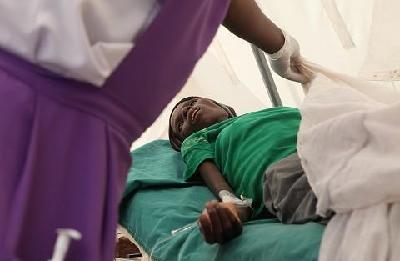
In July, the world's largest AIDS conference will be held in Washington, DC. About 20,000 delegates from 200 countries and more than 2,000 journalists are expected to attend AIDS 2012. This will be the first time the event has been held in the United States since 1990. In the lead-up to the conference, the director of the US Centers for Disease Control and Prevention has given an update on the epidemic at home and abroad.
Many losses along the way
Dr. Thomas Frieden spoke at the Washington-based Center for Strategic and International Studies.
"It's possible, I think, to forget just how bad the HIV epidemic has been. HIV has already killed in this country as many people as died in all wars since the civil war," he said.
And around the world, he said HIV/AIDS remains the biggest infectious disease challenge more than 30 years into the epidemic.
"There have been 65 million HIV infections and 30 million deaths since this epidemic started. In 2010 alone there were 2.7 million new infections and 1.8 million deaths. So the number of people infected continues to grow from 34 million and up," he said.
Most of the infections and deaths have occurred in sub-Saharan Africa. In the early days, before the illness had a name, it was called slim disease, because people were wasting away.
"At the peak of the AIDS epidemic in Africa, HIV accounted for two-thirds of all adult deaths. Can you imagine what that would be like in our own village, our own community? There were communities in which the only business that was increasing was the funeral business," he said.
Frieden said he remembers trying to treat hundreds of patients in the early days of the epidemic. But there was no treatment. Things began to change around 1996 when the first antiretroviral drugs came on the scene. There was initial hope that these were a cure. But it was then realized the drugs could suppress the virus, but not kill it. However, at least in developed countries, the drugs, despite many side effects, could extend lives.
Much has changed since the beginning of the HIV/AIDS epidemic. The 2011 global AIDS progress report says annual incidence of HIV has fallen since 2001 in 33 countries, 22 of them in sub-Saharan Africa. And the overall number of deaths has declined since peaking at 2.2 million in 2005. However, infections and deaths are rising in Eastern Europe and Central Asia.
Tipping point
Nevertheless, Frieden described 2012 at a tipping point. There have been advances in vaccine research, microbicides and especially in the use of antiretroviral drugs.
He said, "We know that treatment as prevention has been documented to reduce transmission by 96 percent. This is remarkable evidence of progress. We now know that if you're on treatment not only will you live longer and healthier, but you'll be 96 percent less likely to spread HIV to others. That's a game changer."
The US government has said the goal of an AIDS-free generation is within reach.
"Meaning that virtually no child will be born with HIV infection; that adults living with HIV don't progress to AIDS; that there is a rapid decline in HIV incidence; that combination prevention can turn the tide on the HIV epidemic just as combination antiretroviral treatment can turn the tide on infection in an individual," he said.
Frieden said the Centers for Disease Control and Prevention has played a major role in fighting HIV/AIDS and other diseases. He says that the CDC has worked closely with PEPFAR, the President's Emergency Plan for AIDS Relief. He praises PEPFAR for getting more people on treatment at lower costs and helping strengthen healthcare systems. The goal is to get many more on antiretroviral treatment, eliminate mother-to-child transmission of HIV, also known as vertical transmission, and get many more men circumcised to prevent HIV infection.
AIDS 2012
The 19th International AIDS Conference will be held in Washington, DC, from July 22nd to the 27th. The conference hasn't been held in the US since 1990 because a travel ban had been in effect for those who were HIV positive. The Bush and Obama administrations worked to eventually lift that ban.
Frieden does expect some protests at AIDS 2012, possibly over budget cuts as nations struggle to recover from the global recession. But he said activists have played a major role over three decades.
"If it weren't for the advocacy in HIV we would not be where we are today. Not just in HIV, but in many other diseases. The HIV advocacy community, I think, showed the way for people suffering from a wide variety of health conditions to demand better treatment, to demand faster results, to demand access to the latest information," he said.
Frieden says security in health means everyone is connected by "the air we breathe, the water we drink and the food we eat." He adds, "A risk anywhere is really potentially a risk everywhere."
microbicide: any agent detrimental to, or destructive of, the life of microbes or bacterial organisms 杀菌剂
antiretroviral drug: 抗逆转录病毒药物
Global fund and big business partner against AIDS
New guidelines would help ensure HIV treatment
Hepatitis C kills more Americans than HIV/AIDS
(来源:VOA 编辑:崔旭燕)
关注和订阅


电话:8610-84883645
传真:8610-84883500
Email: languagetips@chinadaily.com.cn